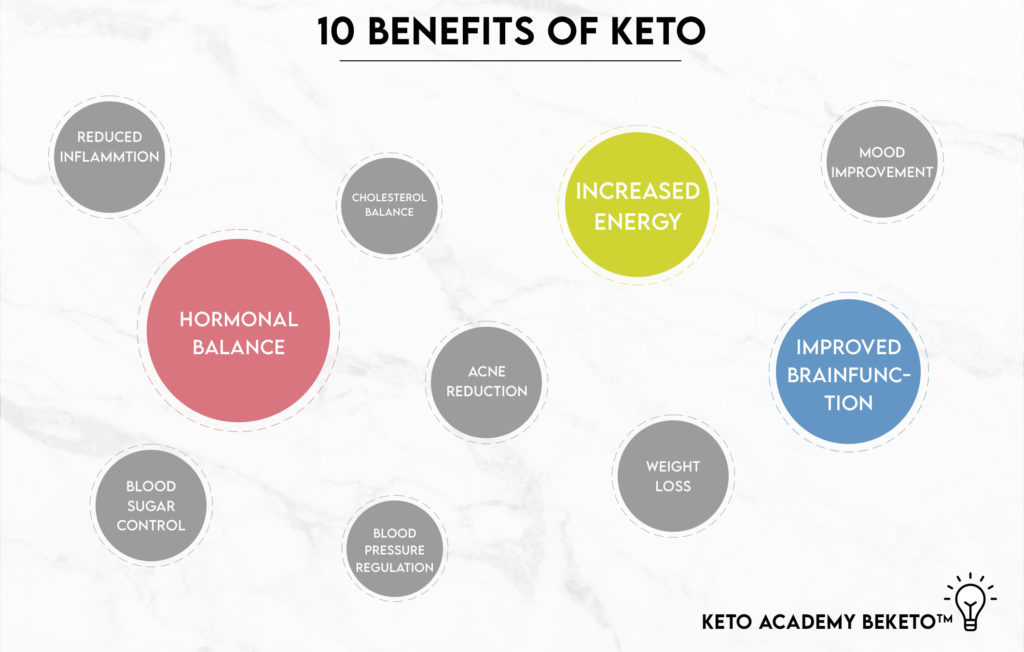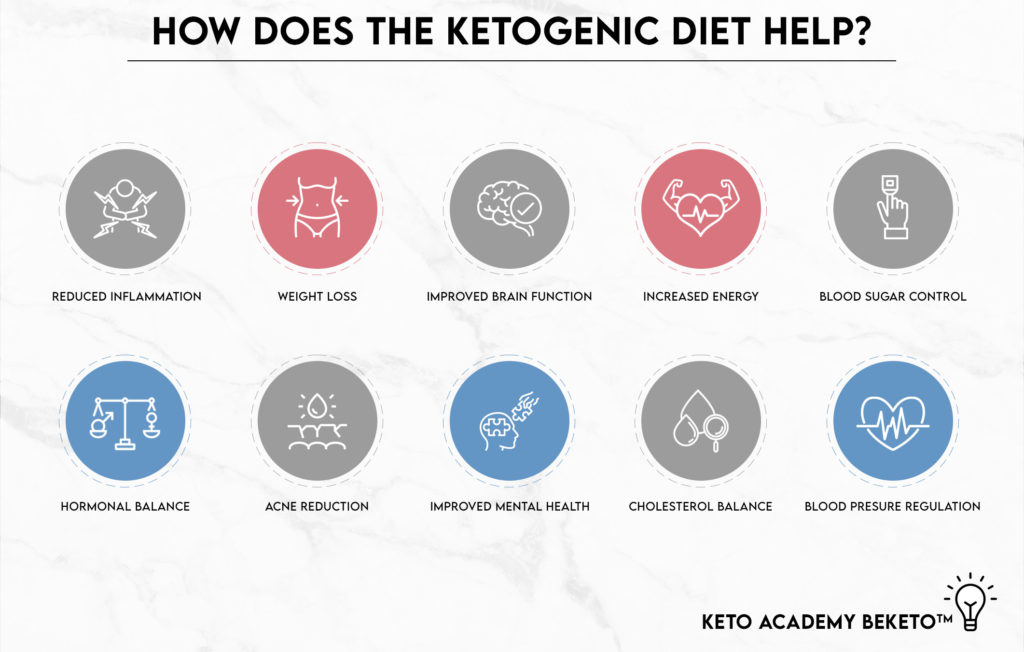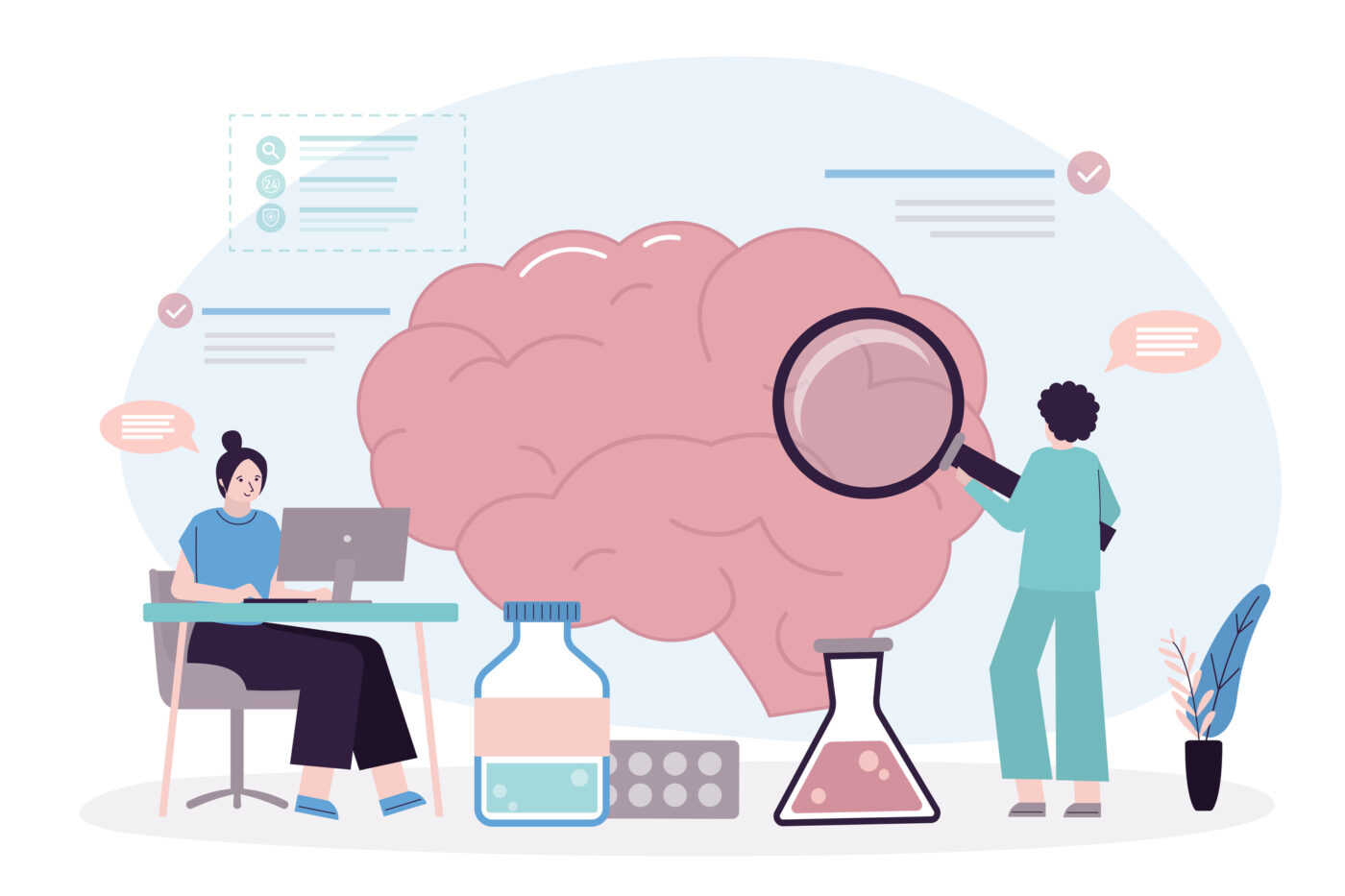10 Health Benefits of the Ketogenic Diet

You may have already read about the benefits of keto and how it can improve your daily life and health. While some researchers think high-fat, low-carb, ketogenic lifestyle change is just another trendy diet, there is an abundance of research that suggests otherwise.
Each person is different, therefore while keto may not be for some, it may be a life-changing revolution to you. There is concrete, solid research which suggests that keto helps those who suffer from epilepsy, neurodegenerative disorders such as Alzheimer’s and Parkinson’s, as well those with obesity-related diseases.
To find out more about how the ketogenic diet improves and reliefs certain medical conditions, read this article.
But – what benefits can keto provide to an otherwise healthy individual?
In this article you will read about ten health benefits of the ketogenic diet and how they aid in:
- Weight Loss
- Brain Function & Mental Focus
- Increased Energy
- Inflammation
- Improved Cholesterol Levels
- Blood Sugar Control
- High Blood Pressure
- Acne
- Hormonal Balance
- Anxiety & Depression

1. Weight loss
Even if you barely know anything about the ketogenic diet, you have definitely heard about the most popular reason people want to go keto: weight loss. From rapid results, to extreme body transformations, there are thousands, if not tens of thousands success stories available on the web.
On keto, your cravings and hunger decrease because energy from fats keeps you satiated for a longer period of time. This is in contrast to low-fat diets, which tell you to eat every few hours. Because you don’t need to eat so often on the ketogenic diet, eating less frequently is directly linked to a calorie restriction and subsequently, weight loss.
No diet will help you lose weight if there is no decrease in your daily calorie consumption.
Research shows that keto helps to achieve long-term results in respect to body weight, compared to those who follow a conventional low-fat diet [*] Patients who desired to lose weight on the ketogenic diet reported a decrease in waist circumference [*], as well as an increase in satiety and lowered hunger cravings [*][*]. The average weight loss for those on the ketogenic diet was nearly twice as high, as opposed to those who use the standard low-fat diet [*].
2. Brain Function & Mental Focus
Most of your enhanced mental clarity on the ketogenic diet comes from your brain having an alternative, constant fuel source – fat. If you often experience poor mental performance, brain fog or an overall lack of productivity, increased production of ketones may help you combat these situations by increasing your productivity.
Studies show that ketosis improves brain function by displaying neuroprotective abilities as well as an increase in GABA levels in cerebrospinal fluid and brain tissue [*][*]. GABA is an amino acid that also happens to be the main neurotransmitter in your body responsible for decreasing stimulation and reduction of activity in the nervous system.
Other research shows that patients who were on the ketogenic diet for several weeks experienced an increase in vitality, alertness and physical functioning [*], as well as improved cognitive function even in advanced age [*].
3. Increased Energy
If you want to feel energetic from morning until night, you’re at the right place. Ketogenic diet is known to reduce fatigue and at the same time, provide sustained energy throughout the day. Standard diets loaded with carbohydrates will give you energy as long as glucose supplies last – then, you will have to wait until your next meal to recharge.
Alternatively, you will not have those issues on the ketogenic diet. Glucose no longer fuels your energy – now, it’s fat. This is why your body no longer depends on your dietary intake and instead, keeps you energetic for a longer period of time.
However, if you decided to switch from your standard diet to the ketogenic diet, you may experience a short period of reduced energy – this is called the “keto flu”. It is a group of symptoms that may feel like the regular flu and it only happens during your transition from using carbohydrates as a primary source of fuel. As you continue on your ketogenic diet journey, within a few days these symptoms will disappear as your body adapts to using fat for energy.
If you want to read more about keto flu, its symptoms and how to get rid of them, click here.
4. Reduced Inflammation
Inflammation is not necessarily a bad thing – it is an immune system response to fight toxins, infections and assist in the progress of healing. However, sometimes our body wants to fight too much even if it doesn’t need to. This is when increased, systemic inflammation can lead to a variety of chronic health problems, including but not limited to asthma, type 2 diabetes, obesity and even Alzheimer’s.
The ketogenic diet also has its health benefits in the reduction of inflammation. Plenty of studies have found a correlation between decreased inflammation and the ketogenic diet.
Research suggests that ketone metabolism and its most abundant ketone body, beta-hydroxybutyrate helps to reduce reactive oxygen species hence diminish pain, swelling and inflammation [*]. Another study showed that keto lowered the levels of proinflammatory cytokines, which is a large group of signaling molecules responsible for the regulation of inflammation [*].
5. Improved Cholesterol Levels
How many times have you heard that the ketogenic diet will raise your cholesterol? Perhaps you can’t even count. Well, that statement may be by far one of the biggest myths and misconceptions about the ketogenic diet.
Cholesterol is a substance that’s produced in your liver and found in every single cell in your body. You need it in order for your body to make hormones, enzymes and most importantly, vitamin D. However, high-levels of cholesterol may contribute to plaque build-up in arteries which can lead to coronary artery disease, strokes and other heart-related problems.
In spite of the “high-fat” requirement of the ketogenic diet, research shows that obese patients who had high levels of cholesterol prior to administering the ketogenic diet experienced a significant decrease in total cholesterol, LDL, triglycerides and blood glucose levels. However, HDL cholesterol (also known as the “good cholesterol”) increased [*][*].

6. Blood Sugar Control
Foods loaded with carbohydrates have the biggest impact on your blood sugar levels. Whether you have diabetes or not, ketogenic diet can positively impact your health by lowering blood sugar levels. This is mainly due to the fact that most carbohydrate-dense foods, such as sugars, starchy fruits and vegetables and grains have a substantial impact on blood sugar. During your ketogenic journey, however, these are the foods you should avoid.
The ketogenic diet allows you to maintain healthy and stable blood glucose levels, reducing the need for extreme insulin spikes. Research shows that the ability of insulin to maintain and regulate blood glucose levels may be affected by your diet. For example, high-fat diets increase insulin resistance. However, high-fat diets combined with a restriction in carbohydrates improve blood glucose levels while reducing the need for insulin [*].
There are several supplements on the market that can help you lower blood sugar naturally, such as cinnamon, moringa, ginseng – the list goes on.
7. Improved Blood Pressure
There is no accurate way to know if you have high blood pressure, unless you get it tested. Healthy, normal blood pressure numbers should be less than 120/80 mm Hg. However, if your numbers are higher than 180/120 mm Hg you should call the emergency immediately, as you may be experiencing a hypertensive crisis.
High blood pressure is a serious risk factor for medical conditions related to your heart, brain and kidneys. If you happen to suffer from high blood pressure, there are ways to improve and prevent it.
Studies show that implementing a low-carb regime into your daily macronutrient intake decreases cardiovascular risk factors, as well as systolic and diastolic blood pressure significantly [*].
8. Acne Control
Acne is a skin condition that causes whiteheads, blackheads and pimples, causing breakouts on your face and body. There is an abundance of factors that affect acne: genetic predispositions, hormones (such as before menstruation or during adolescence), diet and health choices. There are lots of prescription medications available to combat mild to severe acne. However, studies show that isotretinoin, which is a common ingredient in most medical-grade acne prescriptions, is linked to higher suicide rates and suicide attempts [*].
High insulin levels and unbalanced hormones can cause acne outbreaks. As you may have already read, ketogenic diet lowers insulin, balances hormones and reduces inflammation, which may be helpful in improving your skin condition. In addition, researchers found that keto lowers the severity and progression of acne vulgaris [*], not only due to its anti-inflammatory properties, but also due to a restriction in sugars and carbohydrates [*].
9. Balances Hormones
Your hormones play a vital role in your physical, mental and emotional health. There are different types of hormones responsible for things such as controlling your appetite, metabolism, heart rate, blood pressure, growth and development, as well as sex hormones. In simple terms, they serve as messengers that control and organize activity in our bodies.
Hormonal balance is important for our organs and proper body functioning. Alternatively, symptoms of hormonal imbalance include changes in mood, unexplained weight gain or weight loss, anxiety, irritability, headaches, frequent urination, brittle hair and nails, reduced sex drive and infertility, amongst other things.
According to research, ketogenic diet improved free testosterone percentage, luteinizing hormone to follicle-stimulating hormone ratio, fasting insulin levels, an increase in sex-hormone binding globulin and a decrease in androgen secretion [*]. Also, a study found that after a few weeks on the ketogenic diet, insulin, a hormone which regulates your blood sugar levels decreased [*].
10. Reduced Anxiety & Depression
Researchers are just beginning to use keto as a treatment to reduce depression, anxiety and mood disorders – and the results are promising.
People who suffer from mood disorders experience distorted or inconsistent emotions, which may interfere with their social interactions, ability to work and function properly in other parts of their lives. From periods of extreme sadness and irritation, to periods of intense happiness and energy, living with a mood disorder is no easy task.
Whether you have depression, bipolar disorder, anxiety or you suffer from other mood-related disorders, check out the benefits provided by keto. You may ask, how does the ketogenic diet improve my mental health?
Ketosis, a metabolic process induced by the ketogenic diet, is known to be effective in decreasing intracellular sodium concentrations, which is a shared characteristic in currently used mood-stabilizing drugs [*]. Though research on the use of ketogenic diet in battling mental health disorders is scarce, studies show that rats on the ketogenic diet were less likely to experience “behavioral despair” – a similar outcome compared to rats on antidepressants [*].
Additionally, keto switches your brain’s fuel source from glucose to ketones, thus offering another source of energy to your brain cells. This process includes significantly positive effects on the pathophysiology of mood disorders [*].


